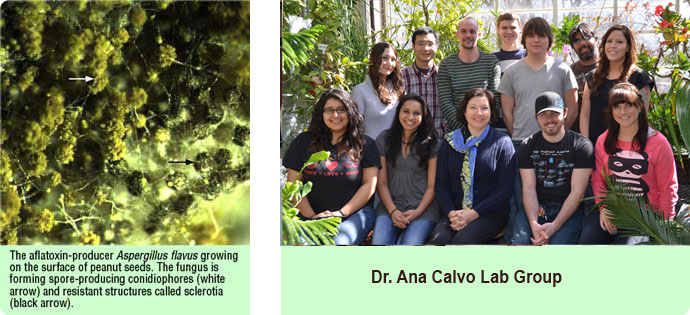Research in the Calvo Lab
Molecular Studies of Agriculturally and Medically Important Fungi
Our research group is investigating genetic regulatory mechanisms that control the beneficial as well as the detrimental impact of fungal species that are of agricultural and medical importance. Fungi produce a wide range of natural products (also denominated secondary metabolites); among them are medical drugs such as antibiotics, anti-tumoral drugs and cholesterol reducing drugs, as well as undesirable compounds such as virulent factors and carcinogenic mycotoxins. The biosynthesis of these compounds is often found to be genetically linked to morphogenesis, including the formation of air-borne spores and the formation of fruiting bodies or of resistant structures that allow these eukaryotic organisms to survive adverse environmental conditions.
Calvo lab research foci:
- One of the major interests of my group is the identification of regulatory elements governing the biosynthesis of mycotoxins, morphological development and virulence, particularly in Aspergillus species. Contamination of the world’s crops (corn, peanut, cotton, sorghum, tree nuts, etc.) with mycotoxins constitutes an important health threat. Current control strategies fail to effectively eliminate mycotoxin contamination. It continues to be a major economic problem in the U.S. and a serious health threat in developing countries. Discovery of new genetic elements regulating secondary metabolism and morphogenesis, or both, will contribute to a better understanding of these signaling pathways and to the establishment of strategies to control fungal dissemination, survivability and/or mycotoxin contamination.
- Due to the conservation of many aspects of the genetic regulatory network across different fungal species, some of the genes involved also have high potential as targets for human and animal disease control. We are also interested in the medical application of our research. In my laboratory we are studying regulatory genes controlling morphogenesis, secondary metabolism and virulence in Aspergillus fumigatus. This fungus is an opportunistic human pathogen capable of causing disease in immuno-depressed patients. Furthermore, the majority (>90% cases) of human invasive mycoses are caused by A. fumigatus. The increasing numbers of patients with hematological malignancies, AIDS infections and patients undergoing chemotherapy or organ transplants, translate into increasing rates of aspergillosis. Our studies contribute to opening new avenues for future detection and treatment of these diseases and other recalcitrant fungal infections.
- While we are trying to reduce the detrimental effects of fungi, we are also trying to enhance those effects that are beneficial, for example the biosynthesis of medical drugs. Elucidation of the regulatory mechanisms that are susceptible to modification could be used to improve production of compounds of biomedical importance.
Our research also benefits from using a well-established model system for molecular and genetic studies, the fungus Aspergillus nidulans. This filamentous fungus is one of the most characterized of eukaryotic organisms. This model is especially productive in the study of secondary metabolism gene clusters and developmental genes, as well as the signal transduction pathways governing these processes.

Ana M. Calvo
amcalvo@niu.edu
Office: MO 341, (815) 753-0451
Lab: (815) 753-1468
Depart. of Biological Sciences
Northern Illinois University
